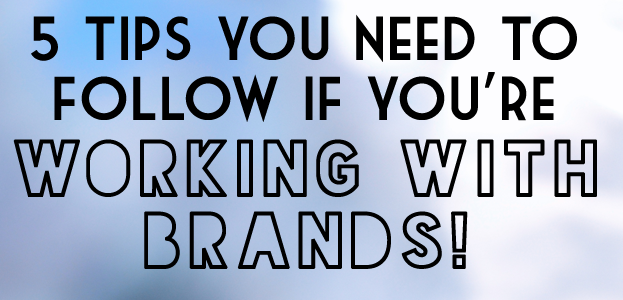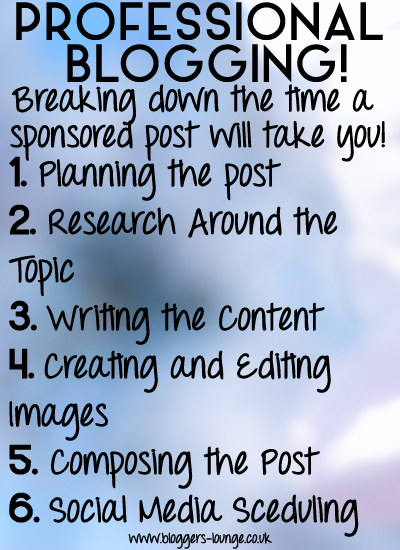
Starting to work with brands is a brilliant step into professional blogging, but it’s not as simple as saying ‘yes!’ to anything you’re offered and jumping in to the project. There are actually quite a few points to consider before you agree to collaborate. It’s important to be incredibly organised, and if you plan to work with brands as a long term business plan then you need to make sure you consider each of the following points before every collaboration.
1. Make Sure the Arrangement is 100% Clear to Both Parties
I’d suggest arranging a call with your contact if you can, things are always so much clearer when you can actually talk to someone rather than emailing! Make sure they understand what you plan to put together- and make sure you understand what they want out of the collaboration. The last thing you want is to spend hours on creating a great piece of content only to find out it’s not fitting with what the brand expected. This will be a disappointing start for both you and your contact at the brand, so send them over a brief of what you’ll be creating to ensure you’re both on the same track.
2. Break Down the Time Your Project with Take you, and Send this Information to Your Contact
It’s important that everyone understands just how much time your content takes you. It can be easy for people to look at a blog post and assume it takes an hour- but there are so many stages to putting a post together. You might want to make note of each of the following and how long they take so you can send this information to the brand:

3. Understand Who Your Main Contact at the Brand Is
Who should you send your final piece to, and who do you direct any questions you might have to? Make sure you’re 100% clear who you’ll be reporting to.
4. Only Sign Up to Something if You’re Sure you Can Deliver What’s Expected
A brand collaboration should be a stepping stone to a long lasting relationship between the two of you! Make sure your first post for the brand is what they’re expecting- if you’re worried you won’t be able to deliver then consider changing the terms to something you’ll be more able to manage. As long as your idea still fits with he brands aims, they’ll appreciate your honesty and in most cases should be able to adjust to your needs too!
5. Find Out How Long Your Payment will Take Before You Start Work
Payment usually takes around a month as invoices will usually be dealt with monthly, however in some cases payment can take up to 3 months. In order to avoid any misunderstandings be sure to ask when you can expect payment so you have a record of your finances.

Fantastic tips, thank you. Being 100% clear is something I learned the hard way altho I still believe that I was not really in the wrong. On completing a sponsored post, I got ames a week later to please make the link a follow link. I explained that I work in line with Google Guidelines and so do not want to change it from no-follow. The PR agent got super irate with me saying that I had been dishonest and would not accept that she should have told me when commissioning me that this is what they wanted. She tried to demand half the fee paid back but I refused as I believe they should have been clear on this matter from the get go and not just assumed I don’t know what I am doing.
As far as I know, all PR’s understand it is best to keep in line with Google’s guidelines and therefor I don’t feel that it should need to be mentioned that this is what I do. But I guess I was wrong in assuming all PR’s play by the book.
Thank you! So glad you liked our post.
It can be totally gutting when things turn sour after a collaboration- it sounds like in this case the situation wasn’t handled very well at all! What a shame they reacted so badly. Maybe it’s worth putting together a sheet of your policies to send to brands that want to work with you, so this doesn’t happen to you again?!
Either way, this just goes to show why transparency is key- both for the sake of brands and bloggers!
Hi Rebecca!
I actually have a question for you if that’s alright. I’ve always been an avid blog reader, and know that a lot of brands will pair up with bloggers with arrangements like what you were mentioning. For example, sometimes companies will sponsor the post simply by providing the product free of charge (I believe).
But now I’m actually on the other side, and will be working part time with a brand to help increase its brand awareness. How does it work? I’ve never been in such an arrangement myself. If I send a blogger a product free of charge, will they generally just write whatever their honest opinion is (a small risk that they don’t like it- publicly post this and possibly hurt the brand instead) or will they be generally positive. Is there a policy that if bloggers don’t like the product they simply won’t review it?
Thanks for your response and clarification!
Hi,
This actually totally depends on the blogger themselves, so if you’re unsure it might be worth clarifying beforehand!
Many bloggers I know simply won’t review a product if they don’t like it, but there plenty of bloggers who will post a negative review as they feel it’s important for their readers to know their honest opinion.
The best thing you can do is follow the first point of this article and make sure that whatever you arrange is clear to you, and whoever you’re working with.
I hope that helps!
Rebecca
Hi Rachel,
Thank you for your reply it definitely gives me a better idea of what to expect. I just had one other question, are actual contracts signed for these type of arrangements?
oops Rebecca*! Sorry for that typo,I don’t know how I could have done tha staring at your reply!